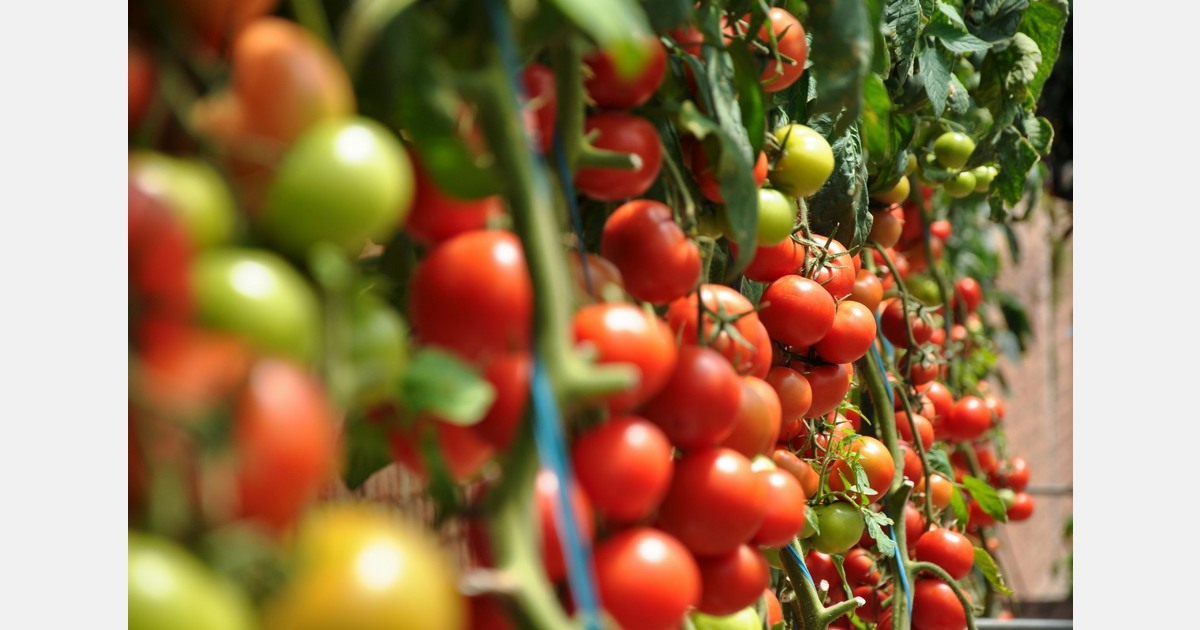By Chinyere Anyanwu
The introduction of four new, high-yielding tomato and pepper varieties by the National Horticultural Research Institute (NIHORT) is rekindling optimism of huge harvests among farmers and agricultural stakeholders.
The Executive Director, NIHORT, Prof. Mohammed Atanda, who announced the release of the seed varieties, said the effort will ultimately boost food security and rural incomes across the country and cut back on spending on importing vegetable seeds.
The newly released varieties, comprising two tomato cultivars – HORTITOM4 and HORTITOM5 – and two yellow aromatic pepper cultivars – HORTIPEP1 and HORTIPEP2 – were officially approved by the National Committee on Naming, Registration and Release of Crop Varieties, Livestock/Fisheries on April 15, 2025.
The development comes as a direct response to the persistent challenges faced by Nigerian tomato and pepper farmers, including low yields, susceptibility to devastating diseases and the use of local varieties with suboptimal fruit quality.
Atanda emphasised the critical importance of the breakthrough for the Nigerian agricultural space.
“Tomato is an indispensable vegetable in Nigerian households, playing a vital role in our daily diets, ensuring food security and generating income and employment across its value chain.
“However, the national average tomato yield of 3.4 tonnes per hectare has consistently lagged behind global standards and that of other African nations. This is largely due to challenges such as susceptibility to diseases, particularly bacterial wilt and the use of less productive local varieties,” he stated.
Highlighting the significance of the new tomato releases, Atanda elaborated on their superior attributes. “HORTITOM4 and HORTITOM5 are pure line varieties with a determinate growth habit, making them well-suited for both open field rainfed cultivation, screen house farming and irrigated systems. Crucially, both varieties exhibit tolerance to bacterial wilt, a major constraint for our tomato farmers. Furthermore, they boast good fruit quality and are packed with essential nutrients, including high levels of Vitamin C, lycopene and total carotenoids,” he said.
Detailing the impressive yield potential and maturity period of the new tomato varieties, Atanda said, “farmers can expect a maturity period of 80 to 90 days with these new cultivars and the potential yields are truly remarkable, ranging from 21.7 to 27.2 tonnes per hectare for HORTITOM5 and HORTITOM4, respectively. This represents a substantial improvement over the existing average yields, which typically fluctuate between 3.9 and 10 tonnes across Nigeria’s diverse ecological zones. These varieties are also well-adapted to the rainforest, derived guinea and Sudan Savanna ecologies, ensuring their suitability for a wide range of farming environments across the country,” he said.
Atanda, who underscored the growing demand for high quality, aromatic hot peppers in Nigeria, said “pepper is a high-value crop, integral to our culinary traditions and a sought-after ingredient in various food preparations. However, pepper cultivation in Nigeria has been hampered by issues such as the lack of quality seeds, vulnerability to pests and diseases, and the absence of improved, high-yielding varieties adapted to our local conditions, leading to disappointing returns for our farmers,” he noted.
He expressed optimism about the impact of HORTIPEP1 and HORTIPEP2, saying, “these are open-pollinated varieties with an erect plant habit and attractive yellow mature fruits. They have demonstrated good adaptability to open field rainfed and screen house cultivation and are well-suited to the rainforest, derived Savanna, Guinea, and Sudan Savanna ecologies.
“Importantly, these new pepper varieties exhibit resistance to cucumber mosaic virus and bacterial wilt, and they are also tolerant to the destructive pepper fruit fly. They are also very pungent and possess excellent nutritional qualities, being rich in capsaicin, Vitamin C and betacarotene.”
Elaborating on the yield and maturity of the new pepper varieties, Atanda said: “Farmers can expect a maturity period of 100 to 125 days with HORTIPEP1 and HORTIPEP2, with potential yields ranging from 18.6 to 20.11 tonnes per hectare. This significant yield improvement, coupled with their disease resistance and desirable fruit characteristics, will greatly benefit our pepper farmers.”
He emphasised the broader implications of these new releases for Nigeria’s agricultural sector and its economy. “These newly released varieties will significantly bolster the efforts of the Federal Ministry of Agriculture and Food Security in taking control and regulating the vegetable seed markets in Nigeria. By providing our farmers with access to high quality, locally adapted seeds, we aim to drastically reduce the need for importing vegetable seeds, which has been a major drain on our foreign exchange. This is a giant leap towards achieving self-sufficiency and stability in our vegetable seed market,” he asserted.
He further highlighted the potential impact on the processing industry. “The enhanced attributes and higher yields of HORTITOM4, HORTITOM5, HORTIPEP1, and HORTIPEP2 will undoubtedly improve the competitiveness of Nigeria’s tomato and pepper value chains. Increased availability of these commodities in the market will also provide a reliable supply of raw materials for the burgeoning tomato and pepper processing industries, creating further economic opportunities,” he said.
Reiterating the overarching goal of this research and development effort, Atanda said, “ultimately, the release of these new varieties is geared towards promoting production, enhancing food security and driving economic growth within the tomato and pepper sectors in Nigeria. They will expand the available options and improve access to superior tomato and pepper varieties for our farmers across the nation,” he said.
He acknowledged that while this is a significant achievement, further work is needed to ensure widespread adoption. “What remains now is the crucial task of massive seed multiplication to ensure that these improved seeds are readily accessible to our farmers. We will be working closely with seed companies, as directed by the Federal Ministry of Agriculture and Food Security, to facilitate this process and ensure that the benefits of this research reach every corner of Nigeria,” he stated.
He expressed confidence that with continued focus and collaboration, Nigeria’s vegetable sector is on the path to significant growth and self-reliance. The release of HORTITOM4, HORTITOM5, HORTIPEP1, and HORTIPEP2 marks a pivotal moment in this journey, promising a brighter future for Nigerian farmers and consumers alike.

